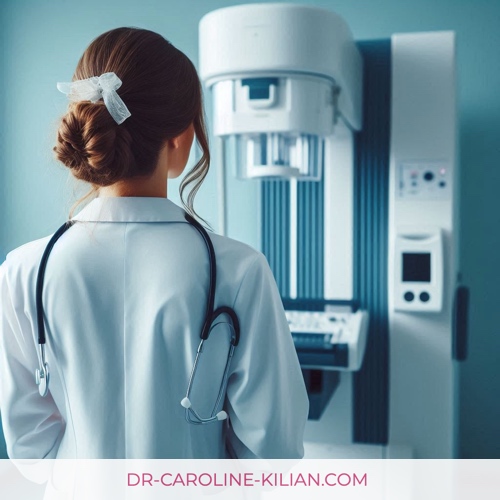Understanding the Initial Shock and Denial Phase
When an individual receives a breast cancer diagnosis, the initial flood of emotions can be overwhelming, launching a complex psychological response often characterized by disbelief and denial. This reaction is a natural defense mechanism, allowing one's mind time to adjust to the profound realities of such life-altering news. Scientific studies elucidate that this phase acts as a cognitive buffer against the immediate distress of the diagnosis, temporarily shielding the psyche from the full impact of the situation. It’s in this interval that the mind grapples with the veracity of the condition, frequently leading to a dissonance between acknowledged facts and emotional acceptance.
As one navigates through this initial phase, the psychological journey is marked by a period of introspection and sometimes, a fervent quest for validation through second opinions or alternative interpretations of medical results. Theoretical frameworks in psychological sciences, such expectational disconfirmation, suggest that the incongruence between expected and actual outcomes can intensify the emotional turbulence experienced during this period. Individuals might find themselves oscillating between hope for a misdiagnosis and the stark confrontation with medical evidences.
Amidst this emotional unrest, the role of healthcare providers becomes pivotal. They not only navigate the delicate task of delivering the diagnosis with empathy but also guide patients through this turbulent phase with information and support. Oncologists and psychologists alike emphasize the importance of clear communication, providing spaces for questions, and offering resources that can help demystify the medical jargon and procedures. This approach aids in gently steering the individual from a state of denial toward a gradual acceptance of reality, fostering a more constructive engagement with the treatment process.
| Phase | Emotional Response | Recommended Support |
|---|---|---|
| Initial Shock and Denial | Disbelief, numbness, denial | Empathetic communication, provision of accurate information, psychological support |
| Anger and Bargaining | Frustration, questioning, bargaining | Support groups, counseling, coping strategies |
| Depression | Sadness, withdraw, hopelessness | Psychological therapy, medication management, holistic care approaches |
| Acceptance | Understanding, acceptance, readiness | Continuous support, rehabilitation services, survivorship care planning |
Embracing the initial phases of shock and denial not as barriers but as integral steps in the journey towards healing underscores the importance of a nuanced, compassionate approach to care. This stage, when navigated with appropriate support and understanding, can set a foundation for resilience and hope, emboldening individuals to engage actively with their treatment and find pathways to acceptance and recovery.
Navigating through Anger and Bargaining Feelings
The emotional upheaval following a breast cancer diagnosis often propels individuals into a turbulent sea of feelings, among which anger is notably profound. This visceral reaction is not merely a response to the diagnosis itself but also to the disruption it causes in one’s life, plans, and perceptions of health and body. It's a natural part of the grieving process recognized in psychological frameworks, reflecting a deep-seated protest against the perceived unfairness of the situation. Scientists and psychologists affirm that acknowledging and expressing these emotions is crucial, as suppressed anger can exacerbate stress, potentially impacting physical health.
Simultaneously, the bargaining stage emerges as a coping mechanism, characterized by the 'if only' propositions that individuals negotiate with themselves or a higher power. It represents an attempt to regain control over the overwhelming uncertainty breast cancer introduces. From a psycho-social perspective, bargaining can manifest in various forms, including meticulous adherence to treatment protocols in the hope of a favorable outcome, or making lifestyle changes with the belief that it could reverse the progression of the disease. Although not inherently detrimental, it’s vital that this phase doesn’t anchor individuals to unrealistic expectations which can hinder acceptance and adjustment to their new reality.
As part of the journey, navigating these intense emotions necessitates a multi-faceted approach. Healthcare professionals emphasize the importance of integrated care, encompassing not only the physical treatment of breast cancer but also psychological support. Psycho-oncology has emerged as a vital field, focusing on the mental health of cancer patients, acknowledging that healing and coping extend beyond the physical aspects. Techniques such as cognitive-behavioral therapy, mindfulness, and support groups are instrumental in providing a constructive outlet for emotions, promoting psychological resilience, and supporting individuals through this deeply personal and challenging experience.
The Depths of Depression in Cancer Diagnosis
Upon receiving a breast cancer diagnosis, individuals often find themselves plunged into profound psychological distress, which can manifest as clinical depression. This phase represents a pivotal moment in the emotional trajectory of cancer patients, where the realization of the diagnosis and its potential implications take a profound toll on mental health. Scientific studies underscore the prevalence of depressive symptoms in this cohort, attributing such emotional states to the sudden upheaval and the uncertainty regarding the future. It's imperative to recognize that this depression is not a mere phase but a significant medical condition requiring attention and care.
The intricacies of navigating through depression highlight the importance of a multidisciplinary approach in cancer care. Specialists advocate for integrated treatment plans that encompass psychological support alongside medical intervention. Research reveals that interventions such as cognitive behavioral therapy (CBT) and mindfulness-based stress reduction (MBSR) offer considerable benefits, mitigating symptoms of depression and enhancing patients' quality of life. Such strategies are pivotal, not only for addressing present emotional turmoil but also for equipping individuals with coping mechanisms for future stressors.

Moreover, the role of social support in ameliorating depressive symptoms cannot be overstated. The solidarity found in support groups, whether in-person or virtual, provides a lifeline for many. Sharing experiences with others who have traversed similar paths fosters a sense of community and belonging, crucial for emotional resilience. Additionally, loved ones play a key role in providing a supportive environment, emphasizing the necessity for open communication and understanding about the complex emotions encountered.
Lastly, it's essential to shine a light on hope and self-compassion in the face of such challenges. Embracing a compassionate approach towards oneself and acknowledging the normalcy of these emotional responses serves as a cornerstone in the healing process. As research continues to evolve, promising therapies and support mechanisms are emerging, offering a beacon of hope for those navigating the depths of depression following a breast cancer diagnosis. Recognizing and addressing these emotional challenges is a vital step in the holistic care of breast cancer patients, ensuring a pathway not only towards physical recovery but also towards mental and emotional well-being.
Finding Acceptance in Your Breast Cancer Journey
Reaching a stage of acceptance is a pivotal moment in the emotional journey of patients confronting a breast cancer diagnosis. This phase transcends mere resignation, marking a transformative process where individuals begin to integrate their diagnosis into their lives, allowing them to move forward with a sense of peace and determination. Scientific studies emphasize the role of acceptance in improving psychological well-being, reducing stress levels, and enhancing the effectiveness of coping strategies. As patients navigate this complex terrain, it becomes crucial to adopt a multidisciplinary approach that addresses not only the physical but also the emotional facets of breast cancer. Acceptance serves as a foundation for adopting a proactive stance towards treatment and recovery, enabling patients to focus on what can be controlled and to find meaning and purpose despite the diagnosis.
The journey to acceptance often involves a delicate balance between acknowledging the realities of the disease and maintaining an optimistic outlook. Researchers advocate for interventions that bolster emotional resilience, such as cognitive-behavioral therapies and mindfulness-based stress reduction techniques, which have shown promise in facilitating acceptance. These strategies encourage patients to confront their fears and uncertainties directly, whilst cultivating a mindset that emphasizes the present moment and self-compassion. In this context, acceptance does not signify surrender but rather a strategic acknowledgment of one's circumstances, which paves the way for more adaptive coping mechanisms and an improved quality of life.
Moreover, acceptance has a profound impact on the therapeutic alliance between patients and healthcare providers. When patients reach a level of acceptance, they are more likely to engage actively in their treatment plans, communicate openly about their concerns, and adhere to prescribed medical interventions. This cooperative dynamic is instrumental in navigating the complexities of breast cancer treatment, underscoring the need for compassionate, patient-centered care that supports individuals in this critical aspect of their journey. As acceptance is cultivated, patients often report a renewed sense of hope and resilience, armed with the knowledge that their diagnosis is a part of their story, but it does not define their entirety.
Seeking and Providing Support Throughout Treatment
The journey through breast cancer treatment is an odyssey that demands not only physical resilience but also emotional and psychological endurance. At the cornerstone of this process lies the indispensable role of a robust support system, encompassing both the receipt and provision of support. Initially, it's pivotal for patients to acknowledge the significance of a multidisciplinary healthcare team. This team, consisting of oncologists, nurses, counselors, and other specialists, tailors the treatment regimen to not only address the malignancy but also to mitigate the emotional turmoil associated with the diagnosis. The science of oncology recognizes that individualized care, which includes mental health support, significantly enhances treatment outcomes and quality of life for patients grappling with the complexities of cancer care.
Moreover, the amalgamation of personal support networks with professional care constructs a scaffold for emotional resilience. Peer support groups, especially those focusing on breast cancer, offer a unique platform where experiences, fears, and aspirations are shared. Empirical studies highlight the therapeutic value of such groups in bolstering emotional health, reducing feelings of isolation, and fostering an environment of mutual understanding and encouragement. Engaging in these groups facilitates a sense of belonging, providing individuals with the assurance that they are not navigating this challenging journey alone.

In addition to structured support groups, the advent of digital health technologies has revolutionized the way support is offered and accessed. Online forums, virtual counseling sessions, and telehealth consultations provide patients with the flexibility to seek support that aligns with their personal preferences and schedules. This digital expansion ensures that geographical barriers do not hinder the accessibility of comprehensive support services, thereby democratizing the availability of essential resources for those in treatment.
Emphasizing the dual nature of support, it is also imperative for patients and their families to recognize the value of reciprocating support. Engaging in advocacy, volunteering, or simply sharing one's story can be incredibly empowering. Not only does this contribute to the broader community of individuals affected by breast and other forms of cancer, but it also reinforces the survivor's own journey towards healing and acceptance. Below is a table summarizing the key elements of support during breast cancer treatment:
| Aspect | Description |
|---|---|
| Multidisciplinary healthcare team | Tailored treatment and emotional support from a team of specialists. |
| Peer support groups | Forums for sharing experiences and fostering mutual encouragement. |
| Digital health technologies | Access to online forums and virtual healthcare services. |
| Reciprocating support | Engaging in advocacy and sharing personal stories for empowerment. |
This holistic approach to support throughout breast cancer treatment not only nurtures the physical well-being of patients but also fortifies their mental and emotional strength, laying the groundwork for a resilient recovery and hopeful future.
Embracing Hope and Resilience for the Future
Hope and resilience stand as crucial pillars in the psychological journey of individuals confronting breast cancer, both embodying the strength to face impending challenges while nurturing an optimistic outlook for the future. Research underscores the importance of cultivating resilience, a dynamic process characterized by the ability to rebound from stressful experiences and adapt to life-changing situations with flexibility and courage. Resilience does not negate the complexity of emotions felt but rather acknowledges them, allowing individuals to find meaning and growth amidst adversity. Empirical studies have shown that resilience can be bolstered through various means including, but not limited to, mindfulness-based stress reduction (MBSR), cognitive-behavioral interventions, and supportive psychotherapy, all aiming to enhance coping strategies, bolster psychological well-being, and mitigate depressive symptoms.
The concept of hope plays a transformative role, acting as a motivational force that propels individuals forward, enabling them to envisage a life beyond their diagnosis. Grounded in positive psychology, hope is linked to better adjustment and quality of life, influencing not only psychological health but also physical well-being. It fosters the adoption of healthier behaviors, engagement in active problem-solving, and pursuit of personal goals. Scientific literature suggests that hope can significantly impact clinical outcomes, positively affecting symptom management, treatment adherence, and overall prognosis. Integrating hope-focused interventions within the comprehensive treatment plan may contribute to more favorable health outcomes and enhanced life satisfaction.
The journey toward embracing hope and fostering resilience necessitates a multifaceted approach, incorporating individual, community, and healthcare system efforts. Embracing a hopeful stance and resilient mindset often involves learning from others' experiences, leveraging support networks, and engaging in activities that promote mental and physical well-being. Healthcare professionals play a pivotal role in championing these attributes by providing empathetic care, validating patients' emotions, and facilitating access to resources and support services. As research continues to unravel the complexities of hope and resilience, tailored interventions that address the unique needs and strengths of each individual offer promise for not only surviving but thriving in the face of breast cancer.







